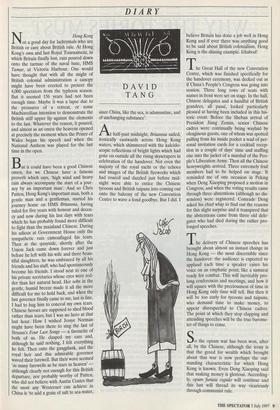DIARY
DAVID TANG Hong Kong No, a good day for lachrymals who are British or care about British rule. At Hong Kong's own and last Royal Tournament, in which Britain finally lost, rain poured down onto the tarmac of the naval base, HMS Tamar, at Victoria Harbour. One would have thought that with all the might of British colonial administration a canopy might have been erected to protect the 4,000 spectators from the typhoon season. But it seemed 156 years had not been enough time. Maybe it was a lapse due to the pressures of a retreat, or some Machiavellian intention to demonstrate the British stiff upper lip against the elements to the last. Whatever the reason, it poured, and almost as an omen the heavens opened at precisely the moment when the Prince of Wales began his speech and when the National Anthem was played for the last time in the open.
But it could have been a good Chinese omen, for we Chinese have a famous proverb which says, 'high wind and heavy rain always accompany the start of a jour- ney by an important man'. And so Chris Patten, Hong Kong's important man, both a gentle man and a gentleman, started his journey home on HMS Britannia, having ruled for five years with honour and decen- cy and now during his last days with tears which he has probably found more difficult to fight than the mainland Chinese. During his adieux at Government House only the sympathetic rain camouflaged his tears. Then at the quayside, shortly after the Union Jack came down forever and just before he left with his wife and three beau- tiful daughters, he was embraced by all his friends and his staff, who had spontaneously become his friends. I stood next to one of his private secretaries whose eyes were red- der than her natural head. Her sobs in the gentle, humid breeze made it all the more difficult for me to hold back, and when the last governor fmally came to me, last in line, I had to hug him to conceal my own tears. Chinese heroes are supposed to shed blood rather than tears, but I was no hero at that last hour. How I wished Jessye Norman might have been there to sing the last of Strauss's Four Last Songs — a favourite of both of us. He clasped my ears and, although he said nothing, I felt everything he felt. Then onto the gangplank, and the royal heir and this admirable governor waved their farewell. But their wave seemed `as many farewells as be stars in heaven' although clearly not enough for this British departure, nor probably worthy of Patten, who did not believe with Austin Coates that the most any Westerner can achieve in China is 'to add a grain of salt to sea-water, since China, like the sea, is adamantine, and of unchanging substance'.
Ahalf-past midnight, Britannia sailed, ironically eastwards across Hong Kong waters, which shimmered with the kaleido- scopic reflections of bright lights which had gone on outside all the rising skyscrapers in celebration of the handover. Not even the majesty of the royal yacht or the echoes and images of the British fireworks which had roared and dazzled just before mid- night were able to entice the Chinese tycoons and British taipans into coming out onto the balcony of the new Convention Centre to wave a fond goodbye. But I did. I believe Britain has done a job well in Hong Kong and if ever there was anything good to be said about British colonialism, Hong Kong is the shining example. Ichabod!
The Great Hall of the new Convention Centre, which was finished specifically for the handover ceremony, was decked out as if China's People's Congress was going into session. Three long rows of seats with names in front were set on stage. In the hall, Chinese delegates and a handful of British grandees, all passé, looked particularly pleased at having been included in this his- toric event. Before the Sheban arrival of President Jiang Zemin, senior Chinese cadres were continually being waylaid by oleaginous guests, one of whom was spotted pulling from his inside pocket a wad of per- sonal invitation cards for a cocktail recep- tion in a couple of days' time and stuffing one into the jacket of a marshal of the Peo- ple's Liberation Army. Then all the Chinese heavyweights arrived. Three extremely frail members had to be helped on stage. It reminded me of one occasion in Peking when Deng Xiaoping proposed a motion in Congress, and when the voting results came through three abstentions (although no dis- sension) were registered. Comrade Deng asked his chief whip to fmd out the reasons for this slight surprise and it transpired that the abstentions came from three old dele- gates who had died during the rather pro- longed speeches.
The delivery of Chinese speeches has brought about almost an instant change in Hong Kong — the most discernible since the handover: the audience is expected to applaud each time a speaker raises his voice on an emphatic point, like a samurai ready for combat. This will inevitably pro- long conferences and meetings, and how it will square with the preciousness of time in Hong Kong only time will tell. But then it will be too early for tycoons and taipans, who demand time to make money, to appear disrespectful to Chinese cadres. The point at which they stop clapping and attending speeches will be the true barome- ter of things to come.
So the opium war has been won, after all, by the Chinese, although the irony is that the greed for wealth which brought about that war is now perhaps the out- standing characteristic for which Hong Kong is known. Even Deng Xiaoping said that making money is glorious. According- ly, opum furiata cupido will continue and this lust will thread its way vicariously through communist rule.


























































 Previous page
Previous page